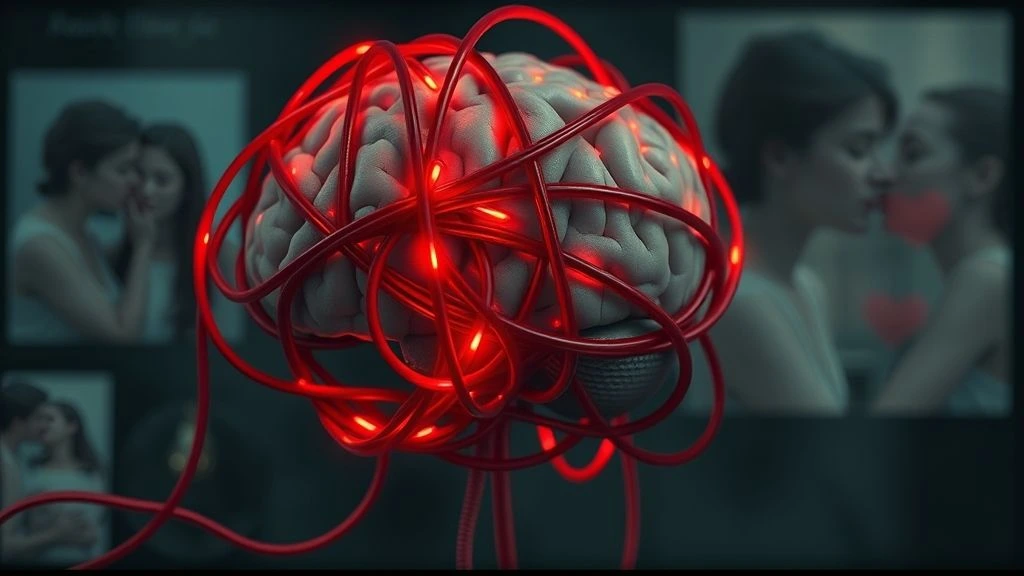
You wake at 3 AM again, chest hollowed out, phone in hand, thumb hovering over their name. The room feels too large, too empty. Your body physically aches for them—not just emotionally, but with a pain so tangible it could bruise. This isn’t weakness. This isn’t drama. This is how to stop missing someone who hurt you begins: by acknowledging the raw, physical reality of what you’re feeling.
I won’t tell you that time heals all wounds. Your brain chemistry right now would argue otherwise. What I will tell you is that understanding what’s happening inside your mind might be the flashlight you need in this darkness.
The Science Behind Why You Can’t Let Go
Your brain doesn’t know the difference between a breakup and cocaine withdrawal. That’s not a metaphor—that’s neuroscience.
When you fell in love, your brain flooded with dopamine, oxytocin, and serotonin—the same neurochemical cocktail released when someone uses addictive substances. Your brain didn’t just enjoy this person; it became chemically dependent on them. Now they’re gone, and your neural pathways are screaming like they’ve been cut off from a drug.
That’s why how to stop missing someone who hurt you feels impossible right now. Your prefrontal cortex—the rational part of your brain that should remind you of how they hurt you—is overwhelmed by your limbic system, which only remembers the high they gave you. You’re not weak. Your brain is literally in withdrawal.

The First Week After Breakup: Your Brain on Fire
The initial days after someone walks away are biological chaos. Your cortisol levels spike, triggering your body’s fight-or-flight response. This is why you might experience:
- Actual physical chest pain (your vagus nerve tightening)
- Insomnia or exhaustion (stress hormones disrupting sleep)
- Appetite changes (your digestive system responding to trauma)
- Obsessive thoughts (your brain trying to solve an impossible equation)
During this time, what you need isn’t advice—it’s survival tools. Your brain is processing trauma while simultaneously craving the very person who caused it. Brain scans show the same regions light up during physical pain as when looking at photos of an ex.
How To Heal a Broken Heart After a Breakup: The Biological Approach
1. Respect the Withdrawal
That urge to text them? It’s not weakness—it’s your brain demanding its fix. Understanding this won’t make the feeling disappear, but it reframes your struggle: you’re not pining for someone who hurt you; you’re detoxing from a biochemical dependency.
Neurologist Dr. Lucy Brown’s research shows love activates the same neural reward pathways as addiction. When you feel that desperate pull, whisper to yourself: “This is withdrawal, not weakness.” Giving it a name helps your prefrontal cortex regain control.
2. Interrupt the Thought Loop
How to stop missing someone who hurt you requires breaking mental loops your brain gets stuck in. When you replay memories, you strengthen neural pathways through repetition.
Try this: When the spiral begins, engage in a cognitively demanding activity—a complex game, counting backward from 100 by 7s, or reciting something memorized. This forces your brain to redirect resources, interrupting obsession.

What To Do After a Breakup: Rewire Your Neural Pathways
Your brain changes physically in response to experiences. Neuroplasticity means you can reshape the connections binding you to pain.
3. Controlled Exposure, Then Redirection
Psychology researcher Dr. Sandra Langeslag found that looking at ex photos reduces pain over time—but only when followed by negative assessment (remembering why it ended) and immediate distraction.
This isn’t villainizing; it’s training your brain to process reality, not idealization. Look at their photo for 30 seconds, acknowledge how they hurt you, then switch to an engaging activity. This extinguishes the reward response.
4. Can’t Stop Thinking About My Ex? Build New Neural Connections
Every new positive experience builds alternate neural pathways competing with ones linked to your ex.
Choose activities that:
- Require full presence (rock climbing, cooking complex recipes)
- Create social bonding (trigger healthy oxytocin release)
- Generate small achievements (completing projects that release dopamine)
Each new experience rewires your brain, creating pathways away from them.
The Psychology of Heartbreak: Your Body’s SOS Signals
5. Your Physical Pain Demands Attention
That ache in your chest isn’t imaginary. University of Michigan researchers found the brain processes social rejection and physical pain in the same regions. Your body is in genuine distress.
How to stop missing someone who hurt you means treating this physical pain seriously:
- Deep breathing stimulates your vagus nerve, easing anxiety
- Gentle movement releases tension your body holds
- Weighted blankets calm the nervous system through pressure
- Warm showers lower cortisol temporarily
Your body’s pain is real. Treat it as such to break the cycle of suffering.
6. The Biochemical Support System
Underrated breakup advice: fix your sleep. Sleep deprivation makes your emotional brain hyperactive and your rational brain impaired.
In plain terms: poor sleep makes you more emotional and less rational about them.
Additionally:
- Protein stabilizes mood
- Omega-3s reduce inflammation from stress
- Limit alcohol to preserve REM sleep (key for emotional processing)
- Light exercise releases natural endorphins without burnout

How To Stop Missing Someone Who Hurt You: The Emotional Rewiring
7. Feel It to Heal It—With Boundaries
Your impulse may be to suppress or drown in emotions. Neither works. Psychologist Dr. James Penne baker’s research shows emotional expression with boundaries—like timed journaling—processes trauma without reinforcing it.
Try the 20-minute rule: Set a timer, feel it fully, write unsent letters, cry if you need. When time’s up, close the journal, wash your face, and switch gears. This teaches your brain it can enter pain and exit it—key in healing.
8. Rewrite Your Story—Literally
Memory is reconstructed each time you recall it. This neurological fact is your secret weapon. When memories surface, add the parts you ignored:
- The fights you minimized
- The anxiety trying to please them
- The parts of yourself you lost
This isn’t villainizing. It breaks their emotional hold by making your memory more complex.
The Path Forward: Beyond Just Surviving
The final stage of healing isn’t forgetting—they’re integrated. Pain is made meaningful without defining you.
9. Post-Traumatic Growth Is Real
Trauma studies show many don’t just recover—they grow stronger, more compassionate, and clearer. This isn’t false hope. It’s neurological fact. The brain rebuilds itself, creating new capacities.
10. The Ultimate Revenge: Neurological Freedom
One day, you’ll realize hours passed without them in your mind. Your brain rewired itself—toward joy, presence, connection, none of it tied to them. It’s not about never thinking of them again. It’s about their thoughts losing power to derail you.

The Final Truth About Healing a Broken Heart
Heartbreak recovery isn’t linear. Setbacks feel like restarts. That’s normal neural behavior—not failure. What to do after a breakup isn’t perfect execution. It’s a gentle, sustained redirection of your brain’s power to adapt, learn, and grow beyond what seems impossible. Your heart isn’t broken. Your brain is transitioning—building something new from loss’s ruins. Unlike the relationship, this is yours to keep.
Your healing is already underway.
Frequently Asked Questions (FAQ)
Q1: Why do I keep missing someone who hurt me so badly?
It’s completely normal. Your brain treats love like an addiction, flooding with chemicals that create strong bonds. Even if they hurt you, your brain craves those feelings, making it hard to let go. Understanding this helps you realize it’s not just about missing the person, but your brain’s chemistry trying to cope.
Q2: How long does it take to stop missing someone after a breakup?
Healing isn’t a set timeline — it varies for everyone. Because your brain is rewiring itself, some days will be better, others harder. With consistent effort and healthy coping strategies, most people start feeling more like themselves in a few months, but emotional ups and downs are normal even after that.
Q3: What’s the best way to stop obsessive thoughts about an ex?
Interrupting the thought loops helps. When you catch yourself obsessing, try shifting your focus with a mentally engaging task—like a puzzle, a hobby, or even reciting something challenging. This tricks your brain into breaking the repetitive cycle and rewiring new habits.
Q4: Is it okay to look at photos or reminders of my ex?
Short, controlled exposure can help some people process emotions, but it must be paired with realistic reminders of why the relationship ended and immediate distraction. This way, you train your brain to see the reality instead of just idealizing the past.
Q5: How do I deal with the physical pain I feel from heartbreak?
Heartbreak activates real pain centers in your brain. Try calming techniques like deep breathing, gentle exercise, warm showers, or using a weighted blanket to soothe your nervous system. Treating your body kindly helps your emotional healing too.
Q6: Why is sleep so important during heartbreak?
Sleep helps your brain process emotions and restore balance between the emotional and rational parts of your brain. Poor sleep makes emotional responses stronger and rational thinking weaker, making missing your ex feel even worse. Prioritize good sleep hygiene for faster healing.
Q7: Can I ever feel happy again after a painful breakup?
Yes! Your brain has incredible neuroplasticity—meaning it can change and grow from hardship. Over time, new experiences and healthy habits help build fresh neural pathways that guide you toward joy, connection, and peace beyond the breakup.
Q8: What if I feel stuck and don’t know how to move forward?
Feeling stuck is part of the healing process. Try small steps like journaling your feelings, setting boundaries on how much you think about your ex, and reaching out for social support. Sometimes professional help, like therapy, can provide personalized strategies to help your brain heal.
Disclaimer: This post is for informational and emotional support purposes only. Every relationship is unique, and this is not professional legal, medical, or mental health advice. Read our full disclaimer.
Affiliate Disclosure: Some links in this post may be affiliate links. If you make a purchase through them, I may earn a small commission at no extra cost to you. Learn more here.
Pingback: Toxic Relationship Signs: How to Recognize, Escape, and Heal for Good - Love and Breakups
Pingback: 💔 10 Common Signs You Are in a Toxic Marriage - Love and Breakups
Pingback: "Why Am I Still Missing Toxic Ex? The Psychological Trap of Trauma Bonding" - Love and Breakups
Чтобы увеличить ссылочную массу, можно выполнить прогон хрумером по трастовым площадкам.